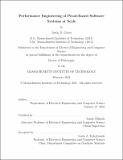Performance Engineering of Proof-Based Software Systems at scale
Author(s)
Gross, Jason S.
Download1252059492-MIT.pdf (2.167Mb)
Other Contributors
Massachusetts Institute of Technology. Department of Electrical Engineering and Computer Science.
Advisor
Adam Chlipala.
Terms of use
Metadata
Show full item recordAbstract
Formal verification is increasingly valuable as our world comes to rely more on software for critical infrastructure. A significant and understudied cost of developing mechanized proofs, especially at scale, is the computer performance of proof generation. This dissertation aims to be a partial guide to identifying and resolving performance bottlenecks in dependently typed tactic-driven proof assistants like Coq. We present a survey of the landscape of performance issues in Coq, with micro- and macro-benchmarks. We describe various metrics that allow prediction of performance, such as term size, goal size, and number of binders, and note the occasional surprising lack of a bottleneck for some factors, such as total proof term size. To our knowledge such a roadmap to performance bottlenecks is a new contribution of this dissertation. The central new technical contribution presented by this dissertation is a reflective framework for partial evaluation and rewriting, already used to compile a code generator for field-arithmetic cryptographic primitives which generates code currently used in Google Chrome. We believe this prototype is the first scalably performant realization of an approach for code specialization which does not require adding to the trusted code base. Our extensible engine, which combines the traditional concepts of tailored term reduction and automatic rewriting from hint databases with on-the-fly generation of inductive codes for constants, is also of interest to replace these ingredients in proof assistants' proof checkers and tactic engines. Additionally, we use the development of this framework itself as a case study for the various performance issues that can arise when designing large proof libraries. We also present a novel method of simple and fast reification, developed and published during this PhD. Finally, we present additional lessons drawn from the case studies of a category-theory library, a proof-producing parser generator, and cryptographic code generation.
Description
Thesis: Ph. D., Massachusetts Institute of Technology, Department of Electrical Engineering and Computer Science, September, February, 2021 Cataloged from the official PDF of thesis. Includes bibliographical references (pages 179-207).
Date issued
2021Department
Massachusetts Institute of Technology. Department of Electrical Engineering and Computer SciencePublisher
Massachusetts Institute of Technology
Keywords
Electrical Engineering and Computer Science.